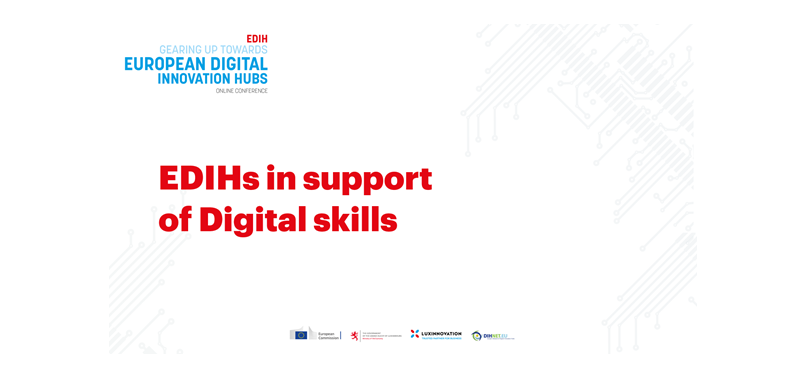I4MS at EDIH in support of Digital skills
During the first annual DIH conference, I4MS representatives and members have been participating in different conferences related to the digitalization of the SMEs. One of the interventions has been focusing on the specific issue of the digital skills gap.
Past January, the first annual DIH conference was jointly organised by the European Commission, Luxinnovation, the Luxembourg Ministry of the Economy and DIHNET. The event gathered Digital Innovation Hubs (DIHs), designated EDIHs, regions and Member States, and various representatives of European Enterprise Network, Clusters, SME associations, public sector organisations and vocational training institutes.
The future of the digital skills in Europe
The panel EDIH in support of Digital skills was focused on how EDIHs can contribute to and benefit from the ongoing and future digital skills activities of the Commission, and other public and private organizations, to promote the digital skills of EU industry and SME workforces.

To start with the session, the moderator Marta Portalés, PhD, EU projects coordinator from MWCapital, one of the I4MS consortium partners, introduced the actual digital skills context in Europe. The audience was also invited to Join the I4MS working group on Digital Skills. The goal of this group is to generate high-level dialogue and policy recommendations that can inspire future actions within Europe. In addition, the public was encouraged to browse the I4MS trainings catalogue, which to the date has over 150 training offers from different European DIHs.
The first speaker of the debate, the European Commission policy officer, Silvia Merisio, described the European strategy of support for education programmes and training courses by introducing the policies and targets at EU level but also by explaining the different opportunities and the implementation approach.
The intervention of Roberto Prieto, chief educator officer of the leading European digital innovation and entrepreneurial education organisation driving Europe’s digital transformation, EIT Digital, has been about the work done with EIT Digital but also the importance of the implementation of the Open Education.
The last speaker was Bernhard Schweizer, head of strategy and operations SME product management at SAP, has been explaining the stages of using digital technologies, defining the importance of design thinking and backwards thinking.
Obstacles and challenges in the digital skills
At the interactive session the audience shared their thoughts on digital skills through a few questions proposed with a poll.

The main obstacle to upskilling workers/citizen would be the time (50%) and then the cost (34%). The low offer of training would only represent 14%. Regarding the offer and the demand for digital talent, it is clearing the upskilling of workers (67%) that is the most relevant answer.
According to the audience, the challenge that SMEs face when adopting new technology is the lack of skills and Knowledge (65%), and with 21%, cost and financing would only be in the second position, following with access to new technology (6%) and support of the ecosystem (6%).
Regarding the gaps to be addressed, more than half of the public answered that it is the offer and demand– Train according to the market needs (56%) that has to be the first to be acknowledged after the gender gap and age’ one
The video session will soon be online.
Find out more information by visiting https://i4ms.eu/join-i4ms/
Marjorie Grassler, In-house consultant at Mobile World Capital Barcelona


